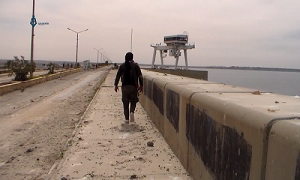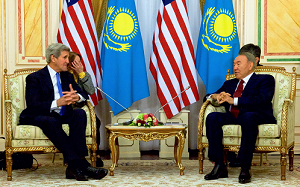Central Asian Militants’ Shifting Loyalties in Syria: The Case of The Turkistan Islamic Party
By Jacob Zenn
April 19, 2017, the CACI Analyst
Since the August 30, 2016 car bombing in front of the Chinese embassy in Bishkek, Kyrgyzstan, concerns have increased about Central Asians carrying out attacks in their homelands after they leave the war in Syria. A growing number of Central Asians in Syria, especially in the Turkistan Islamic Party (TIP), are becoming dissatisfied with al-Qaeda because it is limiting external operations, while the terrorist organization known as the Islamic State in Iraq and Syria (ISIS) is actively promoting attacks abroad. Moreover, a number of TIP fighters disagree with the Syrian al-Qaeda affiliate's re-branding to appear "less al-Qaeda-like" and "more Syrian." ISIS is eager to see defected TIP members in its ranks, which could enable these fighters to target Central Asian or Chinese interests abroad in the name of ISIS.

Central Asia: An Opportunity for the Trump Administration
By Stephen Blank
March 22, 2017, the CACI Analyst
Central Asia has never ranked high on U.S. priorities. That is unlikely to change under the Trump Administration. Yet recent developments in Central Asia, particularly in Uzbekistan, do offer an opportunity to advance U.S. interests through a greater economic-political presence in the region, whilst also countering growing Chinese economic dominance and Russian efforts at military hegemony at a relatively low cost. The two key countries in this possible opportunity for the U.S. are Uzbekistan and Kazakhstan.

The ISIS threat and Moscow's influence in Central Asia and the Middle East
By Dmitry Shlapentokh
November 6, 2015, The CACI Analyst
Moscow has recently undertaken several actions aiming to increase Russia’s influence in the Middle East and Central Asia. On August 23-28, 2015, the Collective Security Treaty Organization (CSTO), which includes several members from Central Asia, undertook military exercises in Russia. Russian authorities stated that the maneuvers aimed to help CSTO members develop means to effectively move airborne forces and other troops to conflict zones, including in Central Asia. The exercises partly served to address a real concern on the part of Russia as well as other CSTO members over the rise of the terrorist organization calling itself the Islamic State (ISIS). However, Russia sees ISIS not only as a threat but also as an opportunity for both increasing Russia’s influence in Central Asia and providing a pretext for its venture in the Middle East.
China pushes Pakistan to fight terrorism selectively
By Sudha Ramachandran (05/08/2015 issue of the CACI Analyst)
While China prods the Pakistani government to crack down on Uighur militants and their bases in North Waziristan, it ignores and even appeases Islamabad’s support of anti-India terrorist groups and has rushed to Pakistan’s defense in international forums. While this may endear Beijing to the Pakistani establishment, a selective approach to terrorism is not productive in the long run as groups like the East Turkistan Islamic Movement are drawing strength from Pakistan’s Inter-Services Intelligence’s terrorism network.







